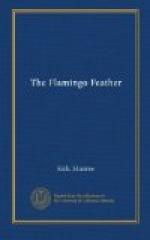As he lay there, thoroughly enjoying the feast and the novelty of the scene, Has-se came to him and placed in his hand the Flamingo Feather that had been cut from his hair on the day before by Chitta’s arrow. As he did so he said, “This I give to thee, Ta-lah-lo-ko, as a token of friendship forever between us, and for thee to keep in memory of this day. It is a token such as may only be exchanged between chiefs or the sons of chiefs; and if at any time it shall be sent to me or any of my people in thy name, whatever request comes with it from thee must be granted even at the cost of life. Keep the emblem hidden, and wear it not, for that may only be done by the chiefs of my tribe, or those who are sons of chiefs.”
As he took the precious feather, and thanked Has-se warmly for the gift and its assurance of friendship, Rene noted with surprise that attached to it was a slender gold chain fastening a golden pin of strange and exquisite make. It was by these that the feather had been confined in Has-se’s hair, and it was the cutting of this chain by Chitta’s arrow that had loosened it.
In answer to Rene’s inquiries Has-se explained that these ornaments came from a distant country in the direction of the setting sun, where gold was like the sands on the shores of the great salt waters, and whence they had reached his tribe through the hands of many traders.[1]
At sunrise on the following morning the journey towards the land of the Alachuas was resumed, and Rene occupied with Nethla a canoe that was paddled by Has-se and Yah-chi-la-ne (the Eagle), Nethla’s young warrior husband. The stream down which they floated soon left the great swamp and widened into a broad river, the high banks of which were covered with the most luxuriant vegetation and beautiful flowers. The Indians called it Withlacoochee, but the Spaniards afterwards changed its name to San Juanita (pronounced San Wawneeta), or Little St. John, from which in these days it has come to be known as the Suwanee.
The river contained great numbers of alligators, of which, when they went into camp, the Indians killed many, for the sake of the valuable oil that was to be extracted from the fat embedded in the joints of their tails.
On the second day after Rene and Has-se joined them the tribe reached the land of the Alachuas, a people speaking the same language with themselves, and bound to them by closest ties of friendship. It was a land of broad savannas, studded with groves of magnolia and oak trees, and abounding in springs of the purest water. The clear streams running from these great springs teemed with the finest fish, and the country watered by them was overrun with game of every variety. It was indeed a land of plenty, and from its peace-loving and hospitable dwellers the visitors from the far East received a warm welcome.
On the very day of their arrival they selected the site for the camp, which they expected to occupy for some months. It was in the midst of a grand oak grove, surrounding a crystal spring; and before sunset the slightly built lodges had sprung up as though by magic among its trees, the sparks from the camp-fires gleamed like myriads of fire-flies among the moss-hung branches, and the tribe was at home.




